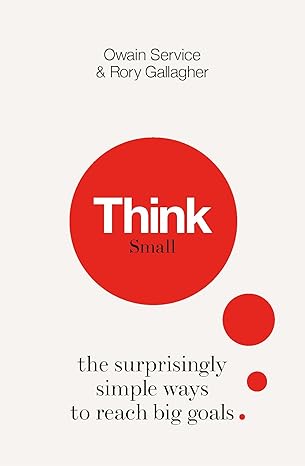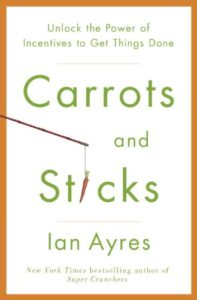If you are trying to achieve any goal, you need to step back and break down the process into a series of progressive steps. Often, when we fail at something, it is because we jumped in feet first, go gung-ho, and then try to succeed by doing the same thing again.
What the literature demonstrates is that you should break down the process into smaller, more manageable goals and tasks, and then to focus on your weaknesses, that need the most work, not your strength. Whatever your overall goal, rather than focusing on the big goal — learning to drive, losing weight, eating healthier, learning a language — you should think small and focus on micro goals and ways to achieve them.
Owain Service and Rory Gallagher are both members of the Behavioral Insights Team, a quasi-governmental unit in Britain more commonly known as the Nudge Unit. The team’s remit is to influence government initiatives based on a scientific understanding of human behaviour. Rather than trying to legislate good social behaviours — like saving for retirement or eating healthier — they find ways to nudge people toward these behaviours, which proves less punitive and more cost-effective.

The two of them co-authored a book, ‘Think Small: The Surprisingly Simple Ways to Reach Big Goals‘, in the hope of distilling the insights from big government policies into problem solving endeavours that can be applied at home.
This is all about taking a long-term ‘macro’ goal and breaking it down into a series of manageable steps, ‘micro’ goals. And unless you get those details right, being very clear about what it is you’re trying to achieve, by when and how, you actually won’t get over those initial hurdles.
They outline a simple, 7 step process by which to achieve any goal:
Small Step 1. Set A Goal
I want to drink less alcohol. I want to exercise more. I want to be less shy. We’ve all said these things to ourselves.
Small Step 2. Make a Plan
The key rule here is thinking about how to make the goal easiest to achieve and know whether you have passed or failed. What would this look like if it were easy? – Tim Ferriss, ‘Tools of Titans‘, p. 602 The Chief Medical Officer‘s advice on not drinking more than 3 – 4 units per day is hard to apply in practice. What is a unit of alcohol? You can work it out or look it up but it takes some effort, particularly after at least one glass of wine. To make it easier, implement a ‘Bright Line’, a clearly defined pass or failure criteria. ‘Don’t drink more than 3 – 4 units of alcohol on average per day’ is quite difficult to know when and whether you have stepped over that rule. So the Bright Line may be ‘no drinking during the week at home’. It is then very obvious and conscious if you step over that line.
Small Step 3. Make a Commitment
Say your goal is to exercise more or keep fit, simply joining the gym will not be enough. You will always find a reason not to go. If your gym is near your home then there will be times when you work late and/or have a long commute back, you will be tired, hangry and not go. If you have your gym on the doorstep to your work, you may think, I just wanna get out of this place’ or “I’ve got so much work to do and I’m almost at my desk, I’ll skip this morning, I can go tomorrow’. Make a public commitment. A declaration. Make a public record of it: write it on a white board, ‘I’m gonna workout twice per week for the next 3 months’. Have a competition with your peers on attendance. Appointment a Commitment Referee, someone to hold you accountable. Not a significant other. They are too empathetic. When you throw a tantrum, stamp your feet and say, ‘I don’t wanna’, they are likely to let you off. Appoint a colleague who you have a good relationship with but they do not put up with your sh*t. Having a Referee doubles your chances of success.
Small Step 4. Give Yourself A Reward or a Punishment
Put something meaningful at stake. Use a small reward to reinforce good behaviour. For instance, if you complete your workout as planned, you can binge watch your favourite TV show. Or, do the rewarding and the less enjoyable tasks at the same time. This is called Temptation Bundling.
Only allow yourself a pedicure whilst catching up on your small business accounting. Only allow yourself to go to your favourite restaurant whilst spending time with a difficult relative whom you should see more often.
In these cases, there is a positive reward attached to a behaviour that is hard to commit to.
Even better, punish yourself for not completing the task. Research suggests that avoiding a negative outcome is more motivational than gaining the benefits. Losing something is more motivational than simply ‘the gains’. That is because, behavioural economists have proven, we value something in our possession more than we value things we don’t own.
How about you agree to donate, or have your Commitment Referee donate on your behalf, to a cause or an organisation you would not want to support, if you do not do the task you assign yourself? For example, if you are not a racist, you may not want to give to the KKK… or UKIP… or a neo-Nazi group. Or if you are a Nazi, you may not want to give to a Holocaust museum or the Anna Frank house. You get it.
If you don’t want to give to racists (though if you really feel that strongly then it would be great motivation), you may want to consider having to wear a football/basketball/hockey/ team’s jersey in public.
Or if you still want to have a financial risk to not completing your task and have a Commitment Referee then companies like stickK (as in the carrot and the stick analogy) may help. These companies work by making you sign a Commitment Contract: a financial wager as well as a Referee to verify your reports. Financial stakes triple your chances of success.

StickK was formed by combining experience and scholarly research. It was founded at Yale University by Dean Karlan (Economics Professor) – who conducted and published research* on Commitment Contracts to help people save money but also recognised people would sign contracts to achieve their personal goals such as losing weight or quitting smoking -, Barry Nalebuff (professor Management), Ian Ayres (professor of Law and Author of Super Crunchers: Why Thinking-By-Numbers is the New Way to be Smart and Carrots and Sticks: Unlock the Power of Incentives to Get Things Done), and Yale student Jordan Goldberg.
*Ashraf, Karlan and Yin, Quarterly Journal of Economics May 2006, “Tying Odysseus to the Mast: Evidence from a Commitment Savings Product in the Philippines”
It is worth noting that rewards, even financial ones, can often backfire. rewards. A classic study by the economists Bruno Frey and Felix Oberholzer-Gee examined the Swiss government’s idea to erect a storage facility for nuclear waste. They surveyed the population and around 50% said that, despite the risk, they were fine with the facility being in their neighbourhood because they felt a sense of civic duty, but when they reframed the question and offered financial compensation of several thousand dollars each, annually, for having the nuclear-waste facility nearby, they got some surprising results. They found a person’s eagerness to take up the offer decreased. This also happens in other areas.
There is current research being conducted in an effort to understand what convinces people to give blood. The hypothesis, which seems to correct, is appealing to a person’s sense of reciprocity and social good, and offering any kind of monetary or tangible reward actually reduced the intrinsic motivations. So the Reward step is tricky. Make sure you choose a reward or a punishment that will make you do the task, not demotivate you.
Small Step 5. Creating Leverage by Telling Others
Tell all your friends what you plan to do. That way whenever they ask you how your goal is going, you will not want to tell them that you are doing a bad job or abandoned it.
Small Step 6. Get Feedback
This step ensures you know how you are doing in relation to your goal. You need to make it efficient, effective and focused on effort whilst comparing yourself to the performances of other persons with the same goal.Don’t just ask, “How am I doing?” You need to ask specific questions and seek actions that you can implement so that you can do something with that feedback.
Small Step 7. Stick With It and Learn From Mistakes
The notions of grit (passion and perseverance); having a growth mindset, and learning from failures, reflecting and making adjustments and trying again are probably familiar to readers of this blog. These concepts have shown up in many of our previous post which draws heavily from the research of Anders Ericsson, Angela Duckworth, and Carol Dweck. I want to redefine genius if you will. I want to define genius as greatness that isn’t necessarily effortless, but in fact, the greatness that is earned however, you do earn it. – Angela Duckworth These authors believe that greatness or achieving a massive goal – whether it be learning maths, getting through intense military boot camps or competing at the Olympics – involves finding a way to be resilient, to bounce back from the inevitable failures that come with growth and learning.
Rory Gallagher, Nudge Unit member and author of ‘Think Small‘, had one such failure when he first moved to Sydney and wanted to surf more. Here is the story he told Stephen Dubber on Freakonomics Radio, which shows that even the author of the process can mess up, every step of the way:
I moved to Bondi Beach, beautiful part of Sydney. And like all ex-pat Brits, had the dream of wake up in the morning and going surfing every morning before work. But goals are hard to achieve. And even with these tools, it’s not absolutely guaranteed that you’re going to get it right. You’re not gonna reach those goals unless you get the details right. In this case, I got the details wrong. First I said, “I’m going to commit to going surfing once a week. I’m going to buy a board and going to see if I can go with a friend.” But I got crucial details wrong in each of those aspects.
First was, although I made a commitment, I didn’t say specifically what day. And partly because surfing depends on the conditions, how big the waves or how small, it was very easy for me to say, “Well, the conditions aren’t quite right today. I’ll go another day.” Because I was doing other things like going for beach runs and cycling, I was able to sort of give myself the fallback that, “I’m doing other fitness work so it doesn’t really matter.”
Second of all, I didn’t test and learn. So what I really should have done is try to find out what type of board would work for me. But I dove in straight away, got this huge 10 foot board that I bought off GumTree. Very excited to get going. And then when I got home, I found out that the board didn’t actually fit in the lift in my apartment.
So in order to even get out the building, I required my partner to help me down this very tight stairwell, which somewhat took out the sort of spontaneity of waking up and going surfing when you require a hand just to get out of the building.
And third of all, I actually went surfing with a friend of mine, Jack, who was actually a pretty decent surfer. When we get down he just swam out to the back of the line up and start with these big waves. And I’d be floundering around in the wash.
In this case, I really should have just joined a surf school or found someone else who was learning to surf…
Achieving goals is a difficult thing. And it’s important to recognize when things aren’t working. And in this case, I recognized look, there are other things going on at the moment, that this wasn’t going to be something I could spend the time and effort to do. And actually I should focus on other parts of my life, which I felt were going to make me happier ultimately.
A lot of the solutions that social science researchers like Duckworth have proven and Owain Service and Rory Gallagher have integrated may appear to be as fundamentally common sense – my crotchety old dad thinks so – but as someone once said, “Common sense ain’t that common”.
If you want to accomplish a big complex goals, you need to make some kind of commitment and think in the micro, not the macro. This may be yet another case of academia formalising what folks in ‘the real world’ have known for ages, but it isn’t applied anywhere near commonly enough. Lot of persons may have an appreciation of the tools but may apply them haphazardly. What this system tries to do is, exactly that, make the process systematic and easily applicable in everyday life.
Now, go get at it!
Scott
PS. A lot of the content of this blog draws from the Freakonomics Radio podcast “Big Returns from Thinking Small” with Owain Service and Rory Gallagher. If you want to listen to this podcast, you can do so below:
- Listen to it on iTunes.
- Stream by clicking here.
- Download as an MP3 by right-clicking here and choosing “save as.”

